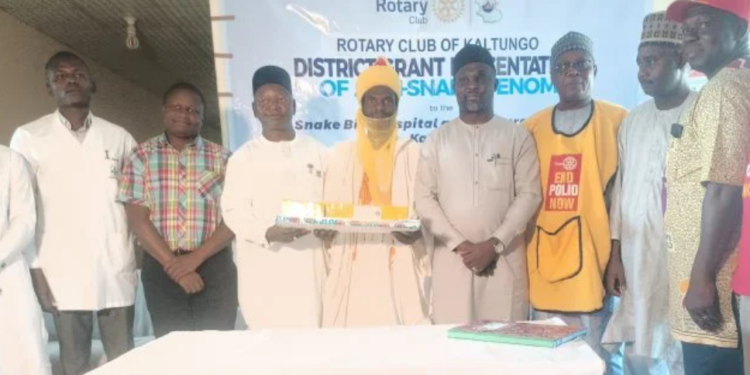The Rotary Club of Kaltungo, in partnership with Rotary International, has donated anti-snake venom worth N13.6 million to the Snakebite Treatment and Research Centre in Kaltungo, Gombe State.
This donation comes as a response to the acute shortage of anti-snake venom in the hospital, which has impacted its ability to effectively treat patients in need.
Explaining the circumstances behind the donation, Mr. Samaila Mohammed, the immediate past President of the Rotary Club of Kaltungo, highlighted how a visit by the Rotary District Governor exposed the hospital’s urgent needs.
“During his visit to the hospital, the District Governor donated some items and was told about the hospital’s struggles due to the acute shortage of anti-snake venom, the Rotary Club quickly reached out to Rotary International, which made this donation possible,” Mohammed stated
Treatment demand
Dr. Nicholas Hamman, Chief Medical Officer of the hospital, advocated for a broader response from the federal government, noting that the Kaltungo Hospital treats an average of 2,600 snakebite cases annually, making it the largest snakebite treatment center in sub-Saharan Africa.
- Dr. Hamman, also expressed deep gratitude for the donation, emphasizing its importance to local farmers and rural patients who frequently encounter snakes in their daily activities. “This is a ‘lifeline’ for many rural patients who are predominantly peasant farmers that often encounter snakes in the fields,” he said.
- He urged for investment in local production of anti-snake venom, which could help reduce costs and make the treatment more accessible nationwide.
“We are committed to ensuring accountability and have asked Rotary representatives to monitor the distribution and use of the anti-snake venom to prevent misappropriation,” Hamman added, affirming the hospital’s commitment to ethical practices.
Nationwide shortage and high costs
Providing further context, Mr. Mohammed Ndus, former Assistant Governor of Rotary International District 9127, noted that a national shortage of anti-snake venom has been exacerbated by the high cost of the medication.
“When sourced from unofficial channels, a vial is N200,000. At the proper channel, a vial is about N170,000,” Ndus explained, adding that the donation of 80 vials will offer immediate relief to the hospital’s patients.
The Kaltungo Local Government Chairman, Iliya Suleiman, commended Rotary’s contribution and encouraged other organizations to follow suit.
“Aside from anti-snake venom, the hospital faces other critical challenges such as inadequate power supply,” he said, noting that he has initiated discussions with the Commissioner of Local Government to find sustainable solutions to these infrastructure issues.
















